Business and Corporate Law Report: Contract and Corporation Law Issues
VerifiedAdded on 2022/09/16
|12
|2320
|18
Report
AI Summary
This report presents a comprehensive analysis of contract and corporation law, addressing key legal issues and providing a detailed examination of relevant case studies. The report begins by exploring the essential elements of a valid contract, including offer, acceptance, intention to create legal relations, consideration, capacity, and legality. It applies these principles to a scenario involving a book publisher and a film company, assessing whether valid contracts were formed at various stages. The report then delves into corporation law, focusing on the consequences of transactions undertaken by a managing director on behalf of a company. It examines the application of sections 125, 126, 127, 128, and 129 of the Corporations Act, along with the principles of indoor management, to determine the company's liability in a scenario involving a loan agreement with a bank. The report concludes with a discussion on the outcome of the case and the liabilities of the parties involved.
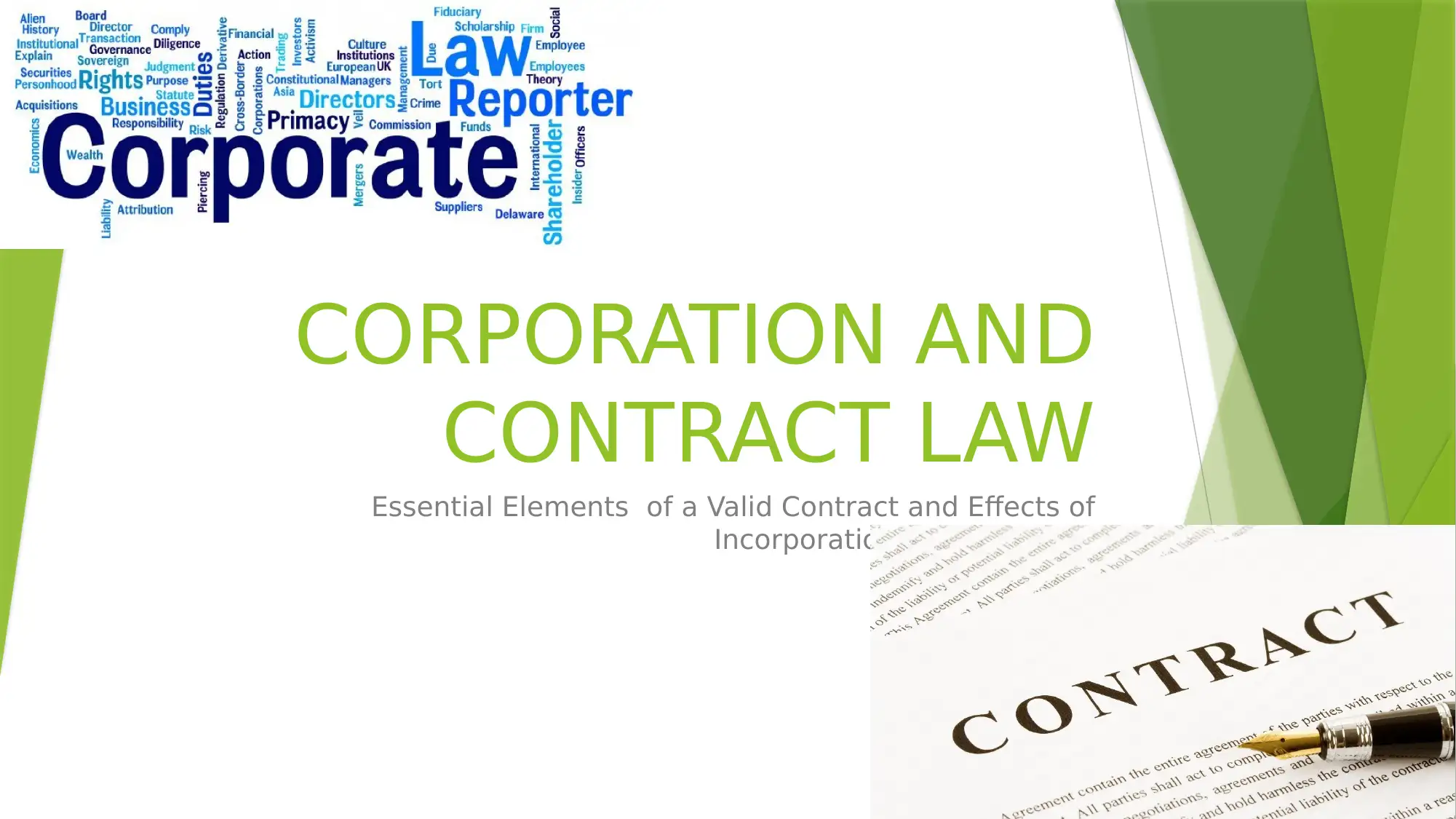
CORPORATION AND
CONTRACT LAW
Essential Elements of a Valid Contract and Effects of
Incorporation of a Company
CONTRACT LAW
Essential Elements of a Valid Contract and Effects of
Incorporation of a Company
Paraphrase This Document
Need a fresh take? Get an instant paraphrase of this document with our AI Paraphraser
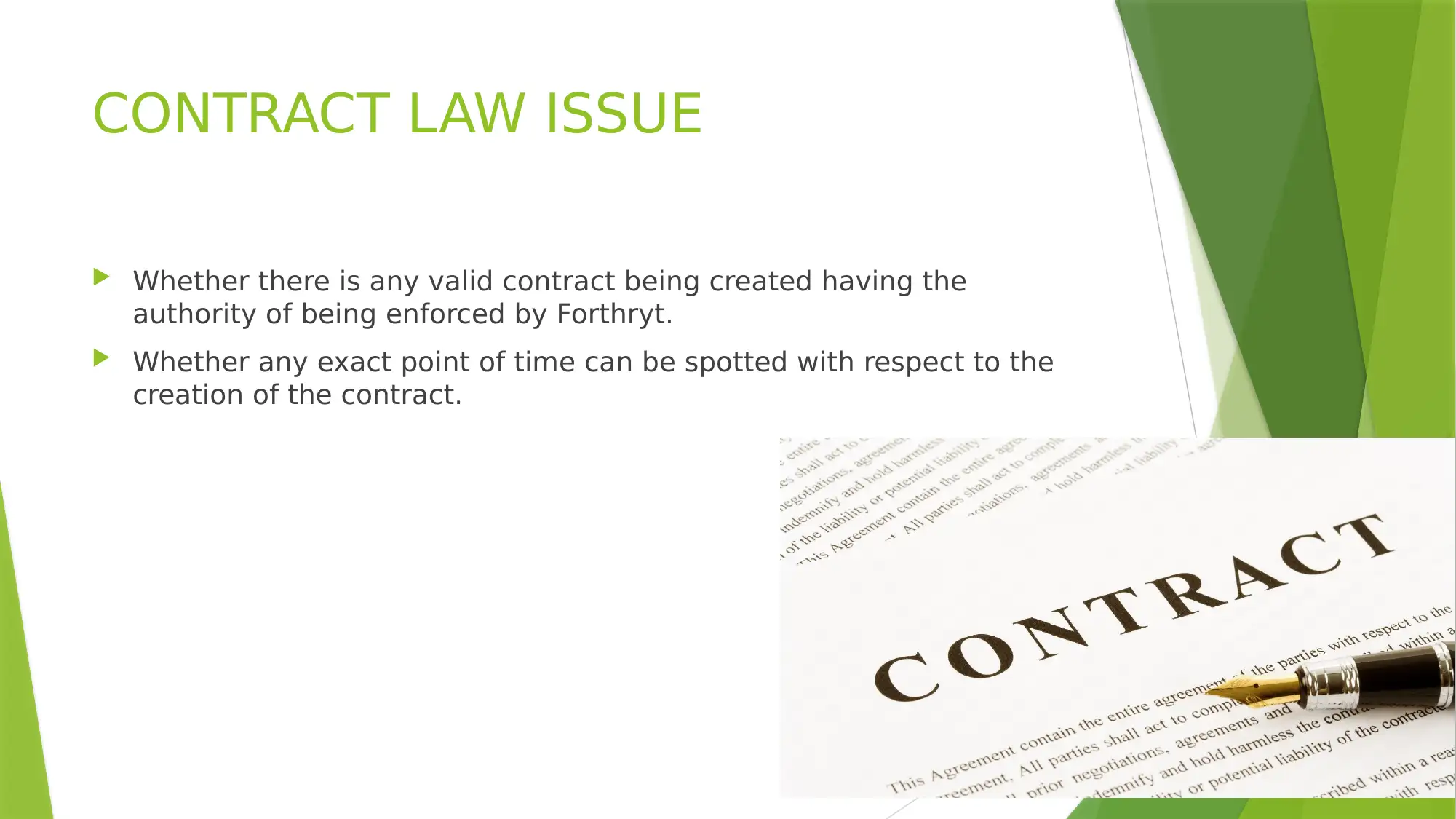
CONTRACT LAW ISSUE
Whether there is any valid contract being created having the
authority of being enforced by Forthryt.
Whether any exact point of time can be spotted with respect to the
creation of the contract.
Whether there is any valid contract being created having the
authority of being enforced by Forthryt.
Whether any exact point of time can be spotted with respect to the
creation of the contract.
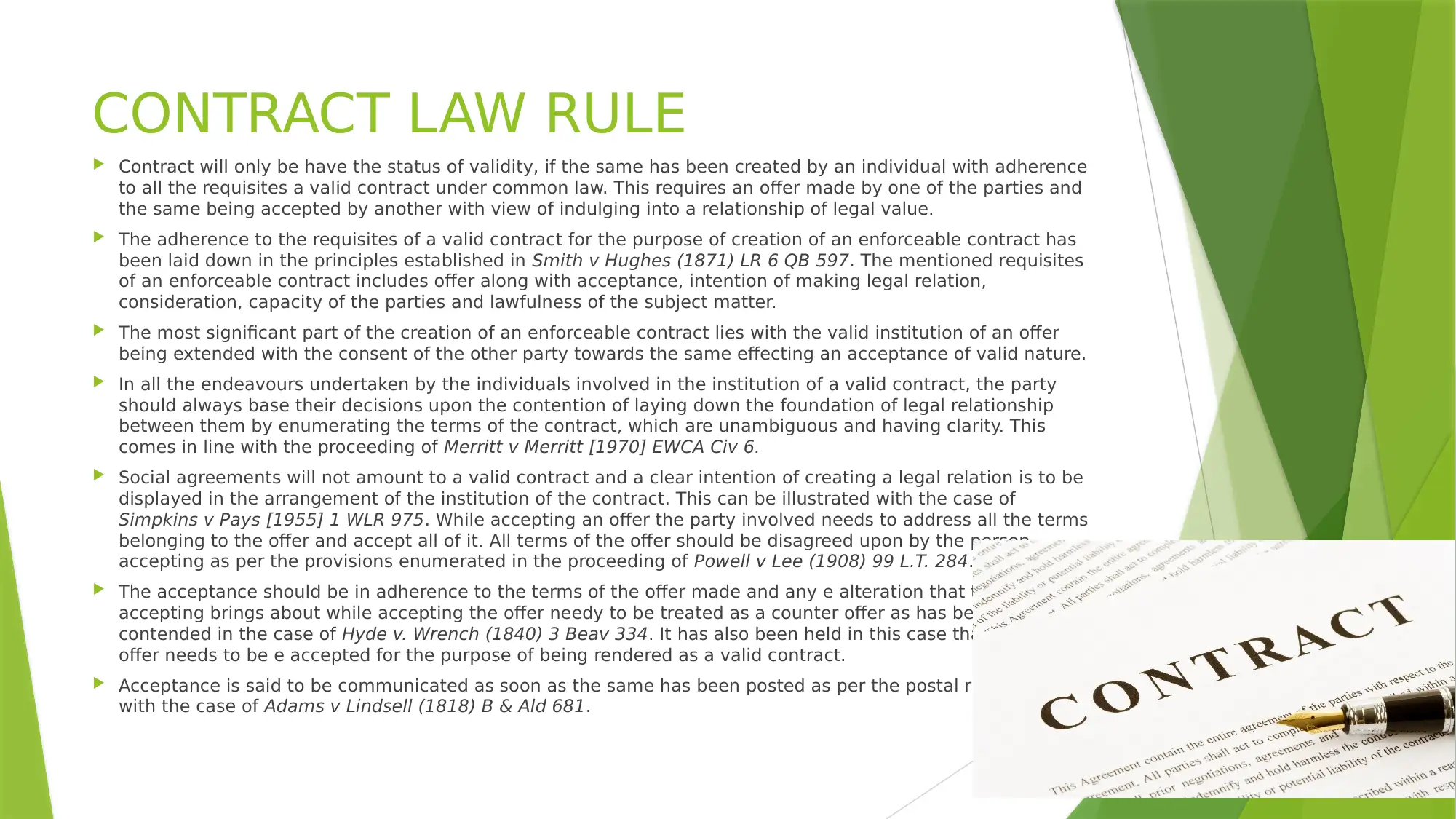
CONTRACT LAW RULE
Contract will only be have the status of validity, if the same has been created by an individual with adherence
to all the requisites a valid contract under common law. This requires an offer made by one of the parties and
the same being accepted by another with view of indulging into a relationship of legal value.
The adherence to the requisites of a valid contract for the purpose of creation of an enforceable contract has
been laid down in the principles established in Smith v Hughes (1871) LR 6 QB 597. The mentioned requisites
of an enforceable contract includes offer along with acceptance, intention of making legal relation,
consideration, capacity of the parties and lawfulness of the subject matter.
The most significant part of the creation of an enforceable contract lies with the valid institution of an offer
being extended with the consent of the other party towards the same effecting an acceptance of valid nature.
In all the endeavours undertaken by the individuals involved in the institution of a valid contract, the party
should always base their decisions upon the contention of laying down the foundation of legal relationship
between them by enumerating the terms of the contract, which are unambiguous and having clarity. This
comes in line with the proceeding of Merritt v Merritt [1970] EWCA Civ 6.
Social agreements will not amount to a valid contract and a clear intention of creating a legal relation is to be
displayed in the arrangement of the institution of the contract. This can be illustrated with the case of
Simpkins v Pays [1955] 1 WLR 975. While accepting an offer the party involved needs to address all the terms
belonging to the offer and accept all of it. All terms of the offer should be disagreed upon by the person
accepting as per the provisions enumerated in the proceeding of Powell v Lee (1908) 99 L.T. 284.
The acceptance should be in adherence to the terms of the offer made and any e alteration that the party
accepting brings about while accepting the offer needy to be treated as a counter offer as has been
contended in the case of Hyde v. Wrench (1840) 3 Beav 334. It has also been held in this case that a counter
offer needs to be e accepted for the purpose of being rendered as a valid contract.
Acceptance is said to be communicated as soon as the same has been posted as per the postal rule involved
with the case of Adams v Lindsell (1818) B & Ald 681.
Contract will only be have the status of validity, if the same has been created by an individual with adherence
to all the requisites a valid contract under common law. This requires an offer made by one of the parties and
the same being accepted by another with view of indulging into a relationship of legal value.
The adherence to the requisites of a valid contract for the purpose of creation of an enforceable contract has
been laid down in the principles established in Smith v Hughes (1871) LR 6 QB 597. The mentioned requisites
of an enforceable contract includes offer along with acceptance, intention of making legal relation,
consideration, capacity of the parties and lawfulness of the subject matter.
The most significant part of the creation of an enforceable contract lies with the valid institution of an offer
being extended with the consent of the other party towards the same effecting an acceptance of valid nature.
In all the endeavours undertaken by the individuals involved in the institution of a valid contract, the party
should always base their decisions upon the contention of laying down the foundation of legal relationship
between them by enumerating the terms of the contract, which are unambiguous and having clarity. This
comes in line with the proceeding of Merritt v Merritt [1970] EWCA Civ 6.
Social agreements will not amount to a valid contract and a clear intention of creating a legal relation is to be
displayed in the arrangement of the institution of the contract. This can be illustrated with the case of
Simpkins v Pays [1955] 1 WLR 975. While accepting an offer the party involved needs to address all the terms
belonging to the offer and accept all of it. All terms of the offer should be disagreed upon by the person
accepting as per the provisions enumerated in the proceeding of Powell v Lee (1908) 99 L.T. 284.
The acceptance should be in adherence to the terms of the offer made and any e alteration that the party
accepting brings about while accepting the offer needy to be treated as a counter offer as has been
contended in the case of Hyde v. Wrench (1840) 3 Beav 334. It has also been held in this case that a counter
offer needs to be e accepted for the purpose of being rendered as a valid contract.
Acceptance is said to be communicated as soon as the same has been posted as per the postal rule involved
with the case of Adams v Lindsell (1818) B & Ald 681.
⊘ This is a preview!⊘
Do you want full access?
Subscribe today to unlock all pages.

Trusted by 1+ million students worldwide
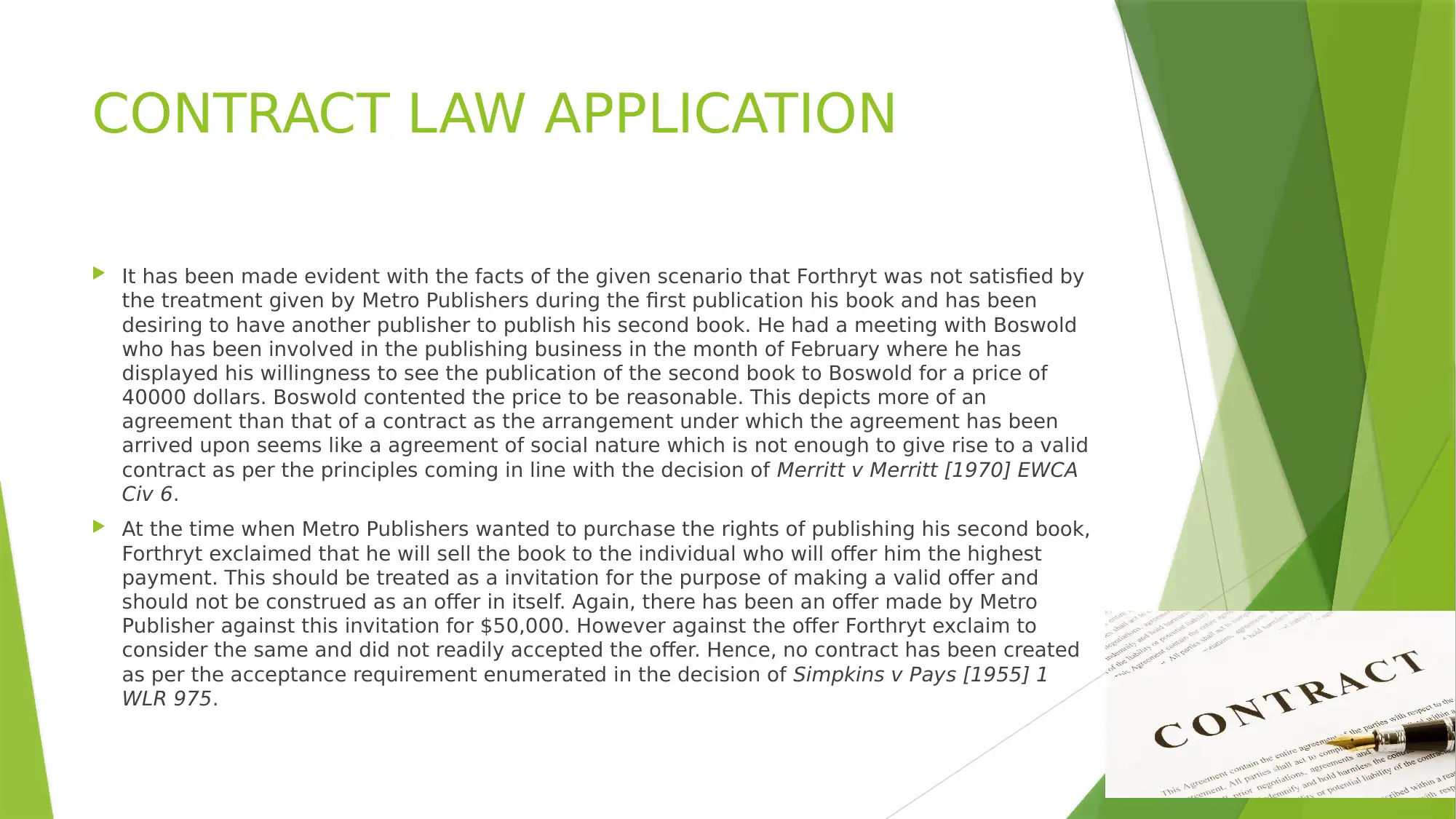
CONTRACT LAW APPLICATION
It has been made evident with the facts of the given scenario that Forthryt was not satisfied by
the treatment given by Metro Publishers during the first publication his book and has been
desiring to have another publisher to publish his second book. He had a meeting with Boswold
who has been involved in the publishing business in the month of February where he has
displayed his willingness to see the publication of the second book to Boswold for a price of
40000 dollars. Boswold contented the price to be reasonable. This depicts more of an
agreement than that of a contract as the arrangement under which the agreement has been
arrived upon seems like a agreement of social nature which is not enough to give rise to a valid
contract as per the principles coming in line with the decision of Merritt v Merritt [1970] EWCA
Civ 6.
At the time when Metro Publishers wanted to purchase the rights of publishing his second book,
Forthryt exclaimed that he will sell the book to the individual who will offer him the highest
payment. This should be treated as a invitation for the purpose of making a valid offer and
should not be construed as an offer in itself. Again, there has been an offer made by Metro
Publisher against this invitation for $50,000. However against the offer Forthryt exclaim to
consider the same and did not readily accepted the offer. Hence, no contract has been created
as per the acceptance requirement enumerated in the decision of Simpkins v Pays [1955] 1
WLR 975.
It has been made evident with the facts of the given scenario that Forthryt was not satisfied by
the treatment given by Metro Publishers during the first publication his book and has been
desiring to have another publisher to publish his second book. He had a meeting with Boswold
who has been involved in the publishing business in the month of February where he has
displayed his willingness to see the publication of the second book to Boswold for a price of
40000 dollars. Boswold contented the price to be reasonable. This depicts more of an
agreement than that of a contract as the arrangement under which the agreement has been
arrived upon seems like a agreement of social nature which is not enough to give rise to a valid
contract as per the principles coming in line with the decision of Merritt v Merritt [1970] EWCA
Civ 6.
At the time when Metro Publishers wanted to purchase the rights of publishing his second book,
Forthryt exclaimed that he will sell the book to the individual who will offer him the highest
payment. This should be treated as a invitation for the purpose of making a valid offer and
should not be construed as an offer in itself. Again, there has been an offer made by Metro
Publisher against this invitation for $50,000. However against the offer Forthryt exclaim to
consider the same and did not readily accepted the offer. Hence, no contract has been created
as per the acceptance requirement enumerated in the decision of Simpkins v Pays [1955] 1
WLR 975.
Paraphrase This Document
Need a fresh take? Get an instant paraphrase of this document with our AI Paraphraser
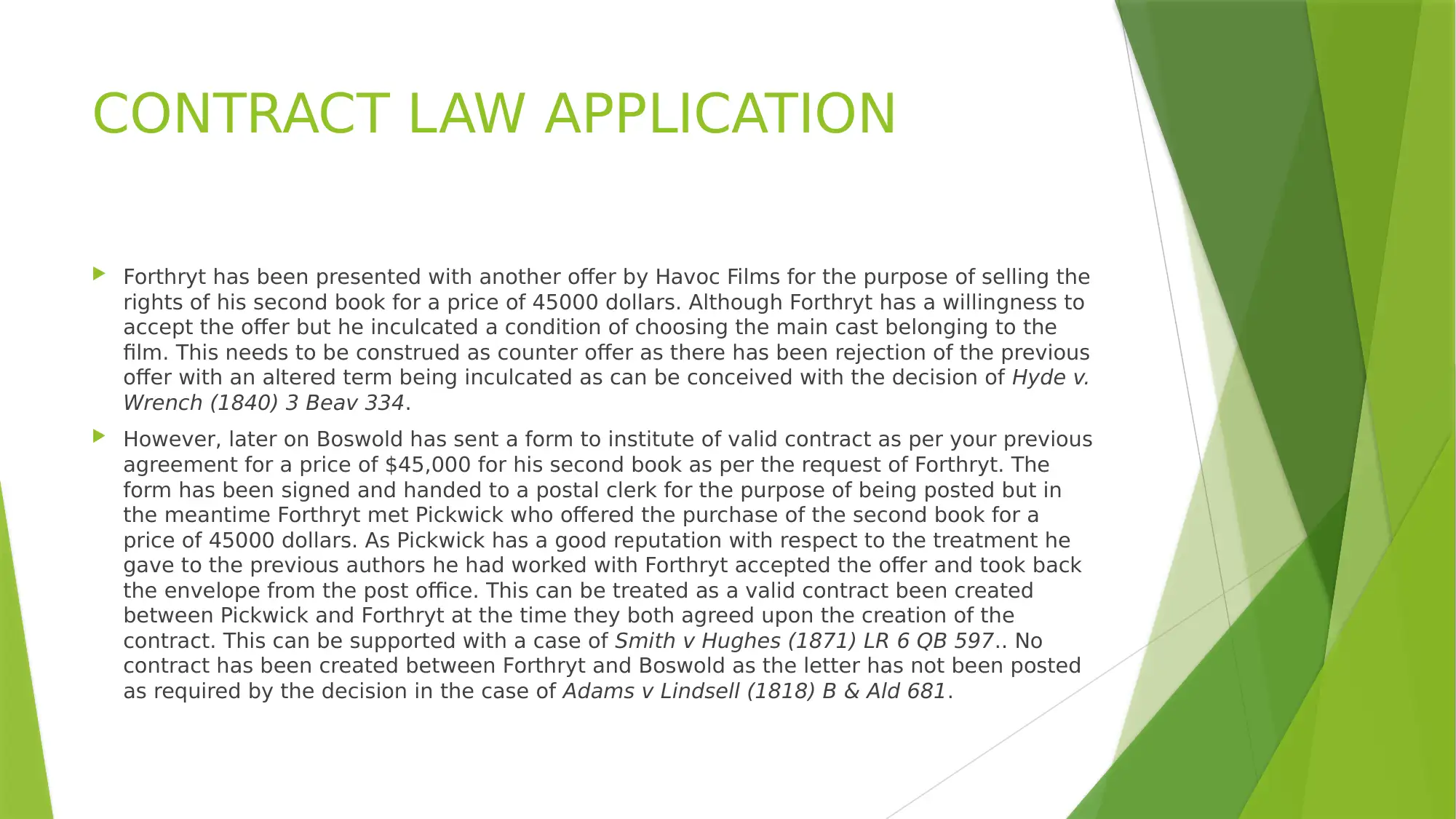
CONTRACT LAW APPLICATION
Forthryt has been presented with another offer by Havoc Films for the purpose of selling the
rights of his second book for a price of 45000 dollars. Although Forthryt has a willingness to
accept the offer but he inculcated a condition of choosing the main cast belonging to the
film. This needs to be construed as counter offer as there has been rejection of the previous
offer with an altered term being inculcated as can be conceived with the decision of Hyde v.
Wrench (1840) 3 Beav 334.
However, later on Boswold has sent a form to institute of valid contract as per your previous
agreement for a price of $45,000 for his second book as per the request of Forthryt. The
form has been signed and handed to a postal clerk for the purpose of being posted but in
the meantime Forthryt met Pickwick who offered the purchase of the second book for a
price of 45000 dollars. As Pickwick has a good reputation with respect to the treatment he
gave to the previous authors he had worked with Forthryt accepted the offer and took back
the envelope from the post office. This can be treated as a valid contract been created
between Pickwick and Forthryt at the time they both agreed upon the creation of the
contract. This can be supported with a case of Smith v Hughes (1871) LR 6 QB 597.. No
contract has been created between Forthryt and Boswold as the letter has not been posted
as required by the decision in the case of Adams v Lindsell (1818) B & Ald 681.
Forthryt has been presented with another offer by Havoc Films for the purpose of selling the
rights of his second book for a price of 45000 dollars. Although Forthryt has a willingness to
accept the offer but he inculcated a condition of choosing the main cast belonging to the
film. This needs to be construed as counter offer as there has been rejection of the previous
offer with an altered term being inculcated as can be conceived with the decision of Hyde v.
Wrench (1840) 3 Beav 334.
However, later on Boswold has sent a form to institute of valid contract as per your previous
agreement for a price of $45,000 for his second book as per the request of Forthryt. The
form has been signed and handed to a postal clerk for the purpose of being posted but in
the meantime Forthryt met Pickwick who offered the purchase of the second book for a
price of 45000 dollars. As Pickwick has a good reputation with respect to the treatment he
gave to the previous authors he had worked with Forthryt accepted the offer and took back
the envelope from the post office. This can be treated as a valid contract been created
between Pickwick and Forthryt at the time they both agreed upon the creation of the
contract. This can be supported with a case of Smith v Hughes (1871) LR 6 QB 597.. No
contract has been created between Forthryt and Boswold as the letter has not been posted
as required by the decision in the case of Adams v Lindsell (1818) B & Ald 681.
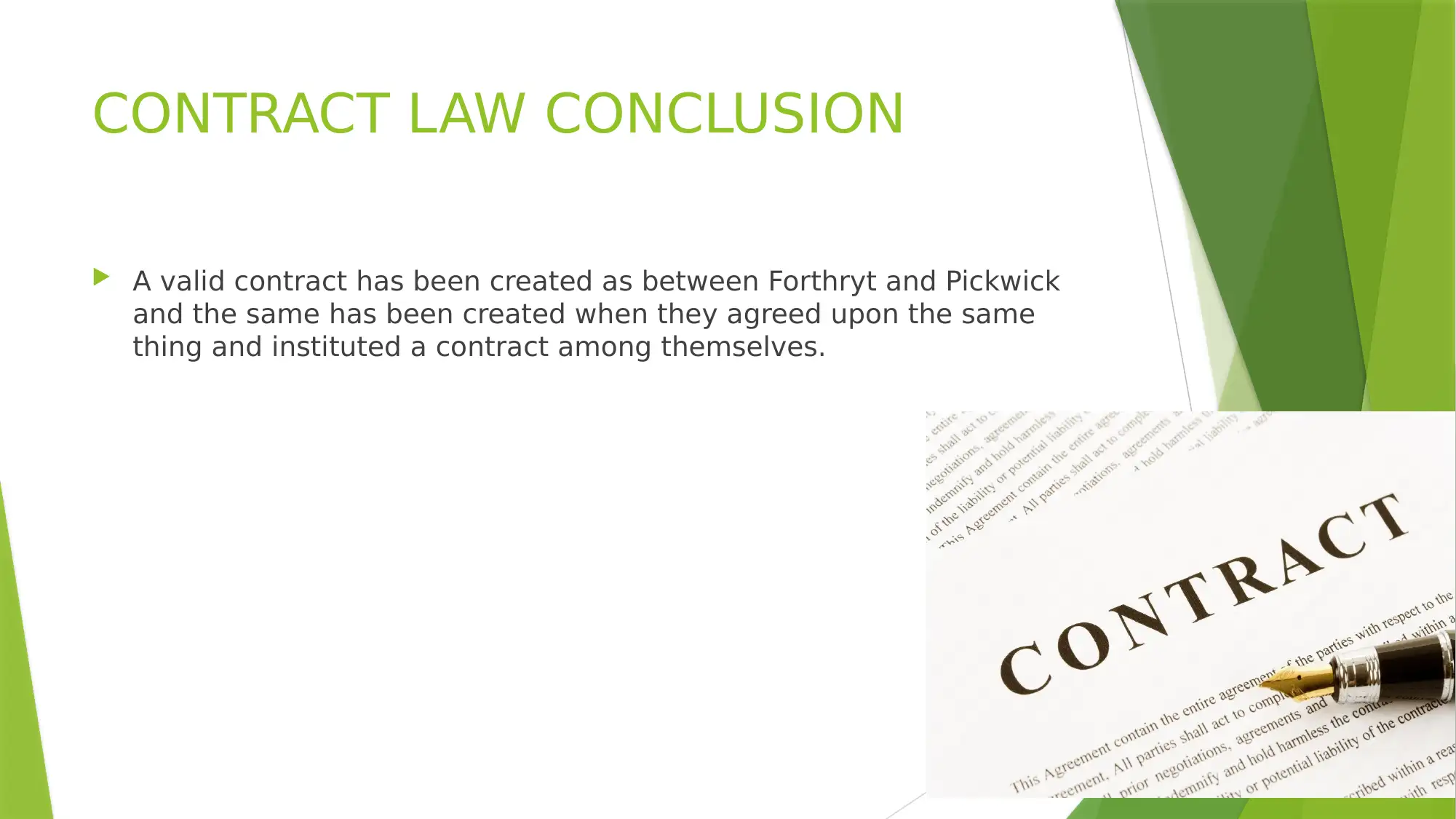
CONTRACT LAW CONCLUSION
A valid contract has been created as between Forthryt and Pickwick
and the same has been created when they agreed upon the same
thing and instituted a contract among themselves.
A valid contract has been created as between Forthryt and Pickwick
and the same has been created when they agreed upon the same
thing and instituted a contract among themselves.
⊘ This is a preview!⊘
Do you want full access?
Subscribe today to unlock all pages.

Trusted by 1+ million students worldwide
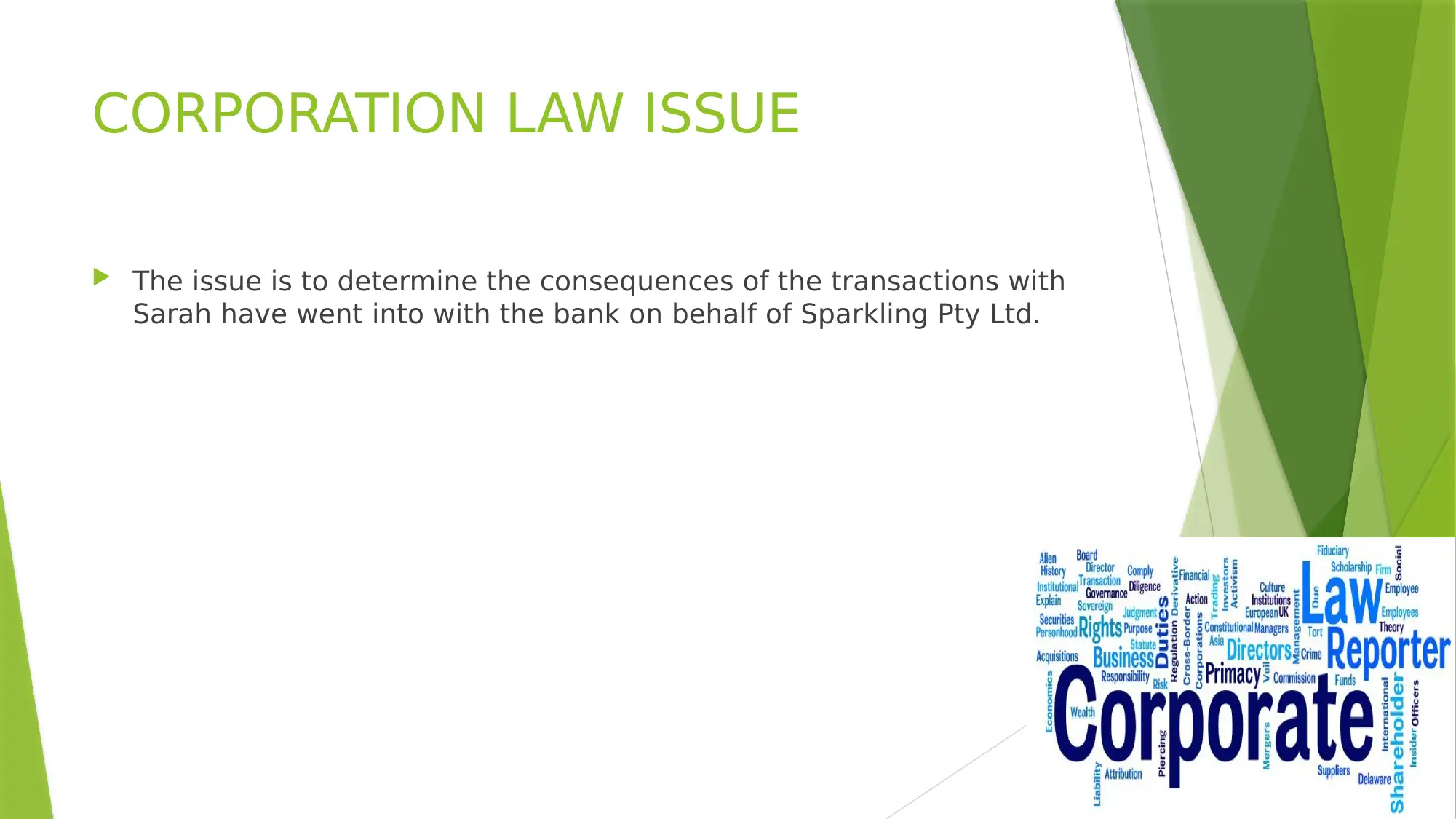
CORPORATION LAW ISSUE
The issue is to determine the consequences of the transactions with
Sarah have went into with the bank on behalf of Sparkling Pty Ltd.
The issue is to determine the consequences of the transactions with
Sarah have went into with the bank on behalf of Sparkling Pty Ltd.
Paraphrase This Document
Need a fresh take? Get an instant paraphrase of this document with our AI Paraphraser
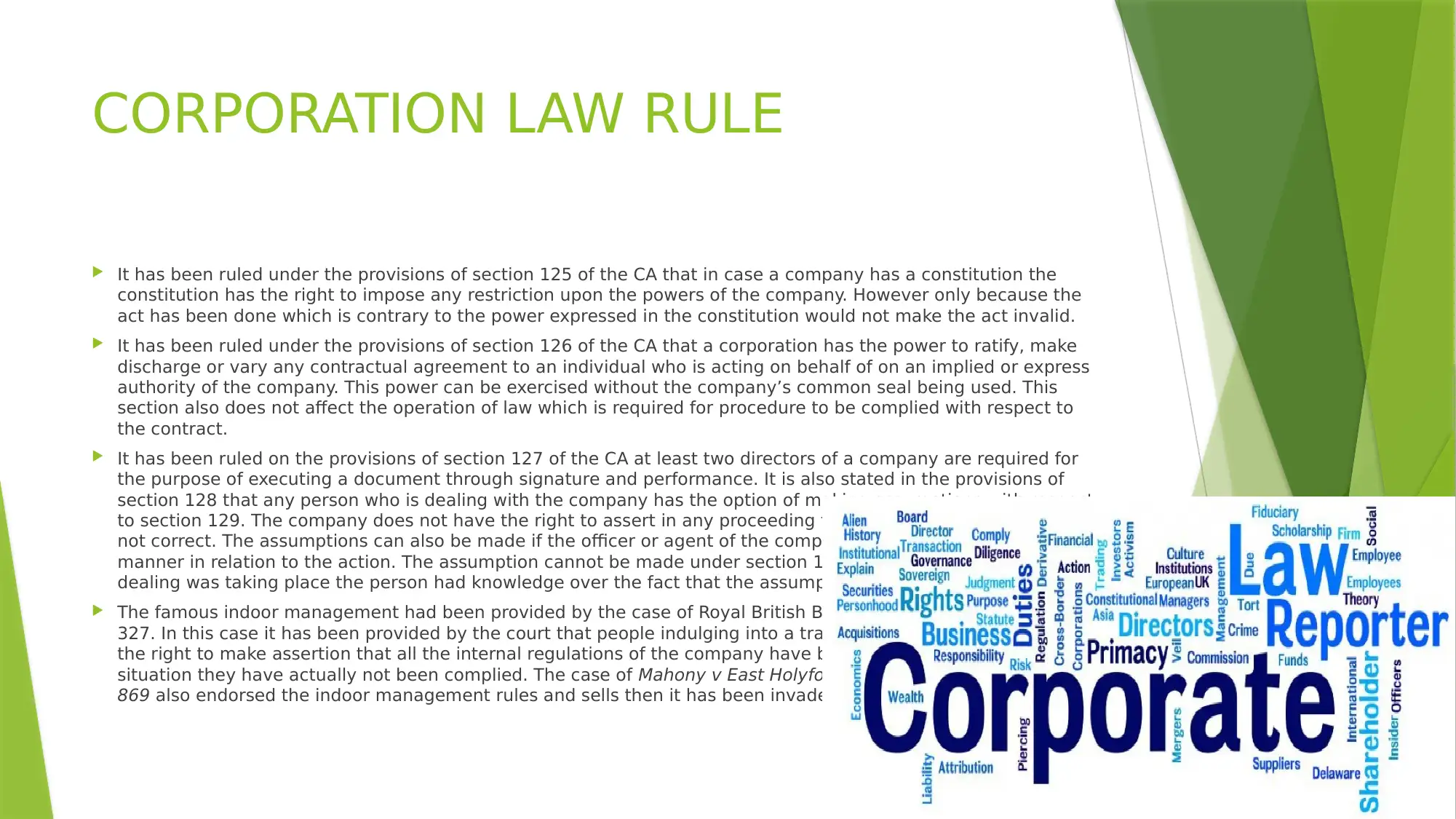
CORPORATION LAW RULE
It has been ruled under the provisions of section 125 of the CA that in case a company has a constitution the
constitution has the right to impose any restriction upon the powers of the company. However only because the
act has been done which is contrary to the power expressed in the constitution would not make the act invalid.
It has been ruled under the provisions of section 126 of the CA that a corporation has the power to ratify, make
discharge or vary any contractual agreement to an individual who is acting on behalf of on an implied or express
authority of the company. This power can be exercised without the company’s common seal being used. This
section also does not affect the operation of law which is required for procedure to be complied with respect to
the contract.
It has been ruled on the provisions of section 127 of the CA at least two directors of a company are required for
the purpose of executing a document through signature and performance. It is also stated in the provisions of
section 128 that any person who is dealing with the company has the option of making assumptions with respect
to section 129. The company does not have the right to assert in any proceeding that the assumption made is
not correct. The assumptions can also be made if the officer or agent of the company has acted in a fraudulent
manner in relation to the action. The assumption cannot be made under section 129 if enter time when the
dealing was taking place the person had knowledge over the fact that the assumption was not correct.
The famous indoor management had been provided by the case of Royal British Bank v Turquand (1856) 6 E&B
327. In this case it has been provided by the court that people indulging into a transaction with a company have
the right to make assertion that all the internal regulations of the company have been adhered to even in
situation they have actually not been complied. The case of Mahony v East Holyford Mining Co (1875) LR 7 HL
869 also endorsed the indoor management rules and sells then it has been invaded in company law effectively.
It has been ruled under the provisions of section 125 of the CA that in case a company has a constitution the
constitution has the right to impose any restriction upon the powers of the company. However only because the
act has been done which is contrary to the power expressed in the constitution would not make the act invalid.
It has been ruled under the provisions of section 126 of the CA that a corporation has the power to ratify, make
discharge or vary any contractual agreement to an individual who is acting on behalf of on an implied or express
authority of the company. This power can be exercised without the company’s common seal being used. This
section also does not affect the operation of law which is required for procedure to be complied with respect to
the contract.
It has been ruled on the provisions of section 127 of the CA at least two directors of a company are required for
the purpose of executing a document through signature and performance. It is also stated in the provisions of
section 128 that any person who is dealing with the company has the option of making assumptions with respect
to section 129. The company does not have the right to assert in any proceeding that the assumption made is
not correct. The assumptions can also be made if the officer or agent of the company has acted in a fraudulent
manner in relation to the action. The assumption cannot be made under section 129 if enter time when the
dealing was taking place the person had knowledge over the fact that the assumption was not correct.
The famous indoor management had been provided by the case of Royal British Bank v Turquand (1856) 6 E&B
327. In this case it has been provided by the court that people indulging into a transaction with a company have
the right to make assertion that all the internal regulations of the company have been adhered to even in
situation they have actually not been complied. The case of Mahony v East Holyford Mining Co (1875) LR 7 HL
869 also endorsed the indoor management rules and sells then it has been invaded in company law effectively.
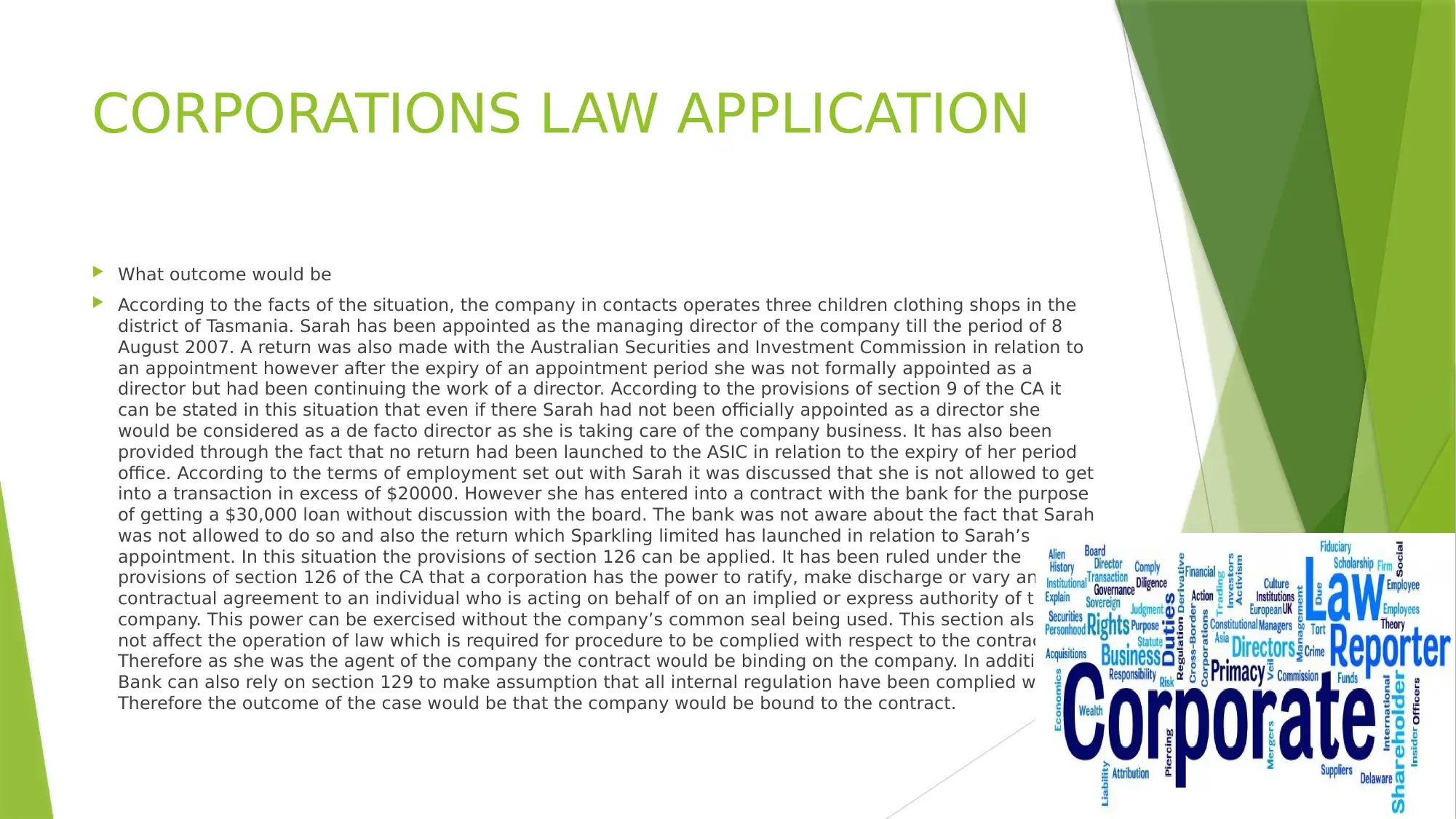
CORPORATIONS LAW APPLICATION
What outcome would be
According to the facts of the situation, the company in contacts operates three children clothing shops in the
district of Tasmania. Sarah has been appointed as the managing director of the company till the period of 8
August 2007. A return was also made with the Australian Securities and Investment Commission in relation to
an appointment however after the expiry of an appointment period she was not formally appointed as a
director but had been continuing the work of a director. According to the provisions of section 9 of the CA it
can be stated in this situation that even if there Sarah had not been officially appointed as a director she
would be considered as a de facto director as she is taking care of the company business. It has also been
provided through the fact that no return had been launched to the ASIC in relation to the expiry of her period
office. According to the terms of employment set out with Sarah it was discussed that she is not allowed to get
into a transaction in excess of $20000. However she has entered into a contract with the bank for the purpose
of getting a $30,000 loan without discussion with the board. The bank was not aware about the fact that Sarah
was not allowed to do so and also the return which Sparkling limited has launched in relation to Sarah’s
appointment. In this situation the provisions of section 126 can be applied. It has been ruled under the
provisions of section 126 of the CA that a corporation has the power to ratify, make discharge or vary any
contractual agreement to an individual who is acting on behalf of on an implied or express authority of the
company. This power can be exercised without the company’s common seal being used. This section also does
not affect the operation of law which is required for procedure to be complied with respect to the contract.
Therefore as she was the agent of the company the contract would be binding on the company. In addition the
Bank can also rely on section 129 to make assumption that all internal regulation have been complied with.
Therefore the outcome of the case would be that the company would be bound to the contract.
What outcome would be
According to the facts of the situation, the company in contacts operates three children clothing shops in the
district of Tasmania. Sarah has been appointed as the managing director of the company till the period of 8
August 2007. A return was also made with the Australian Securities and Investment Commission in relation to
an appointment however after the expiry of an appointment period she was not formally appointed as a
director but had been continuing the work of a director. According to the provisions of section 9 of the CA it
can be stated in this situation that even if there Sarah had not been officially appointed as a director she
would be considered as a de facto director as she is taking care of the company business. It has also been
provided through the fact that no return had been launched to the ASIC in relation to the expiry of her period
office. According to the terms of employment set out with Sarah it was discussed that she is not allowed to get
into a transaction in excess of $20000. However she has entered into a contract with the bank for the purpose
of getting a $30,000 loan without discussion with the board. The bank was not aware about the fact that Sarah
was not allowed to do so and also the return which Sparkling limited has launched in relation to Sarah’s
appointment. In this situation the provisions of section 126 can be applied. It has been ruled under the
provisions of section 126 of the CA that a corporation has the power to ratify, make discharge or vary any
contractual agreement to an individual who is acting on behalf of on an implied or express authority of the
company. This power can be exercised without the company’s common seal being used. This section also does
not affect the operation of law which is required for procedure to be complied with respect to the contract.
Therefore as she was the agent of the company the contract would be binding on the company. In addition the
Bank can also rely on section 129 to make assumption that all internal regulation have been complied with.
Therefore the outcome of the case would be that the company would be bound to the contract.
⊘ This is a preview!⊘
Do you want full access?
Subscribe today to unlock all pages.

Trusted by 1+ million students worldwide
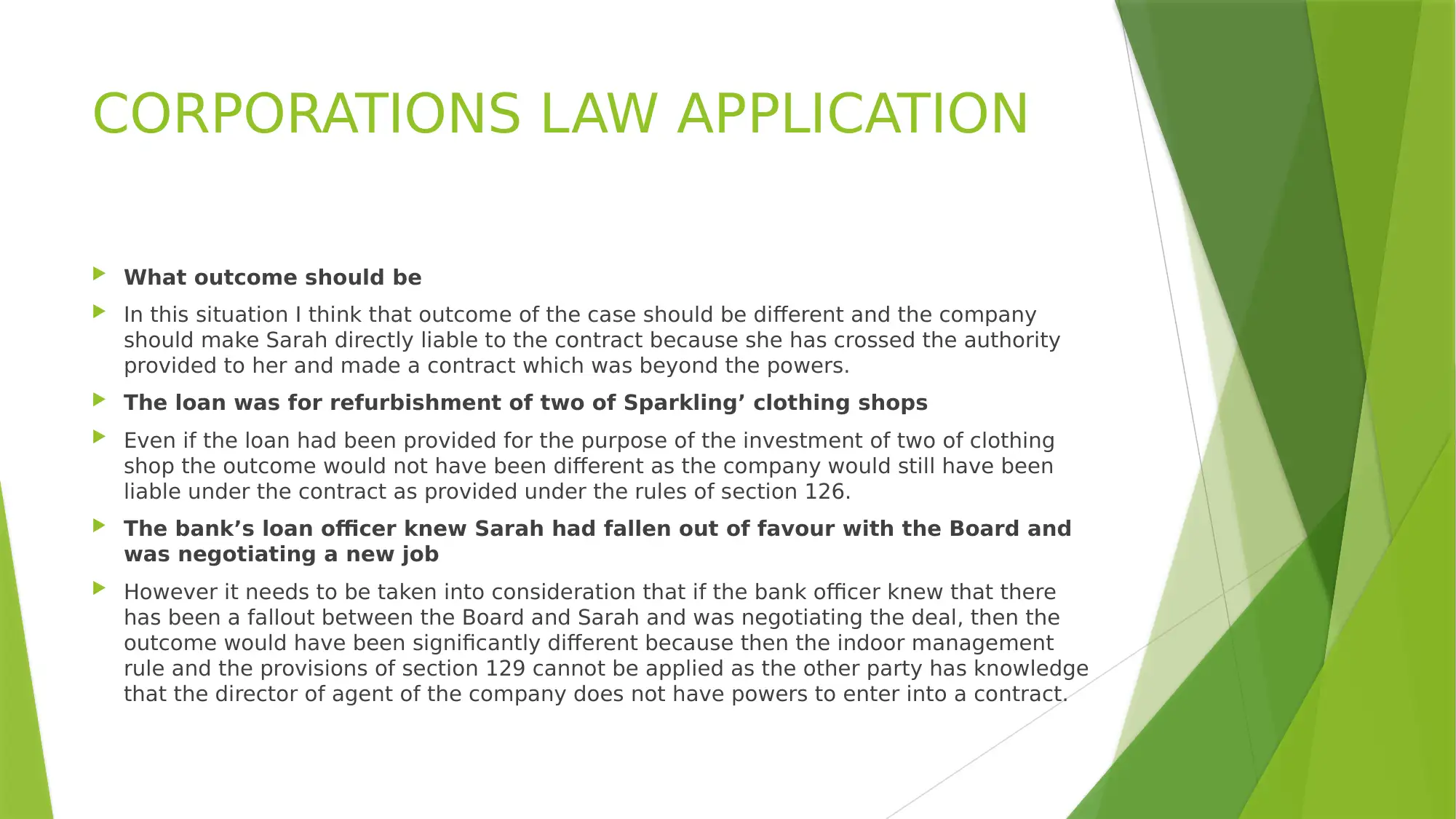
CORPORATIONS LAW APPLICATION
What outcome should be
In this situation I think that outcome of the case should be different and the company
should make Sarah directly liable to the contract because she has crossed the authority
provided to her and made a contract which was beyond the powers.
The loan was for refurbishment of two of Sparkling’ clothing shops
Even if the loan had been provided for the purpose of the investment of two of clothing
shop the outcome would not have been different as the company would still have been
liable under the contract as provided under the rules of section 126.
The bank’s loan officer knew Sarah had fallen out of favour with the Board and
was negotiating a new job
However it needs to be taken into consideration that if the bank officer knew that there
has been a fallout between the Board and Sarah and was negotiating the deal, then the
outcome would have been significantly different because then the indoor management
rule and the provisions of section 129 cannot be applied as the other party has knowledge
that the director of agent of the company does not have powers to enter into a contract.
What outcome should be
In this situation I think that outcome of the case should be different and the company
should make Sarah directly liable to the contract because she has crossed the authority
provided to her and made a contract which was beyond the powers.
The loan was for refurbishment of two of Sparkling’ clothing shops
Even if the loan had been provided for the purpose of the investment of two of clothing
shop the outcome would not have been different as the company would still have been
liable under the contract as provided under the rules of section 126.
The bank’s loan officer knew Sarah had fallen out of favour with the Board and
was negotiating a new job
However it needs to be taken into consideration that if the bank officer knew that there
has been a fallout between the Board and Sarah and was negotiating the deal, then the
outcome would have been significantly different because then the indoor management
rule and the provisions of section 129 cannot be applied as the other party has knowledge
that the director of agent of the company does not have powers to enter into a contract.
Paraphrase This Document
Need a fresh take? Get an instant paraphrase of this document with our AI Paraphraser
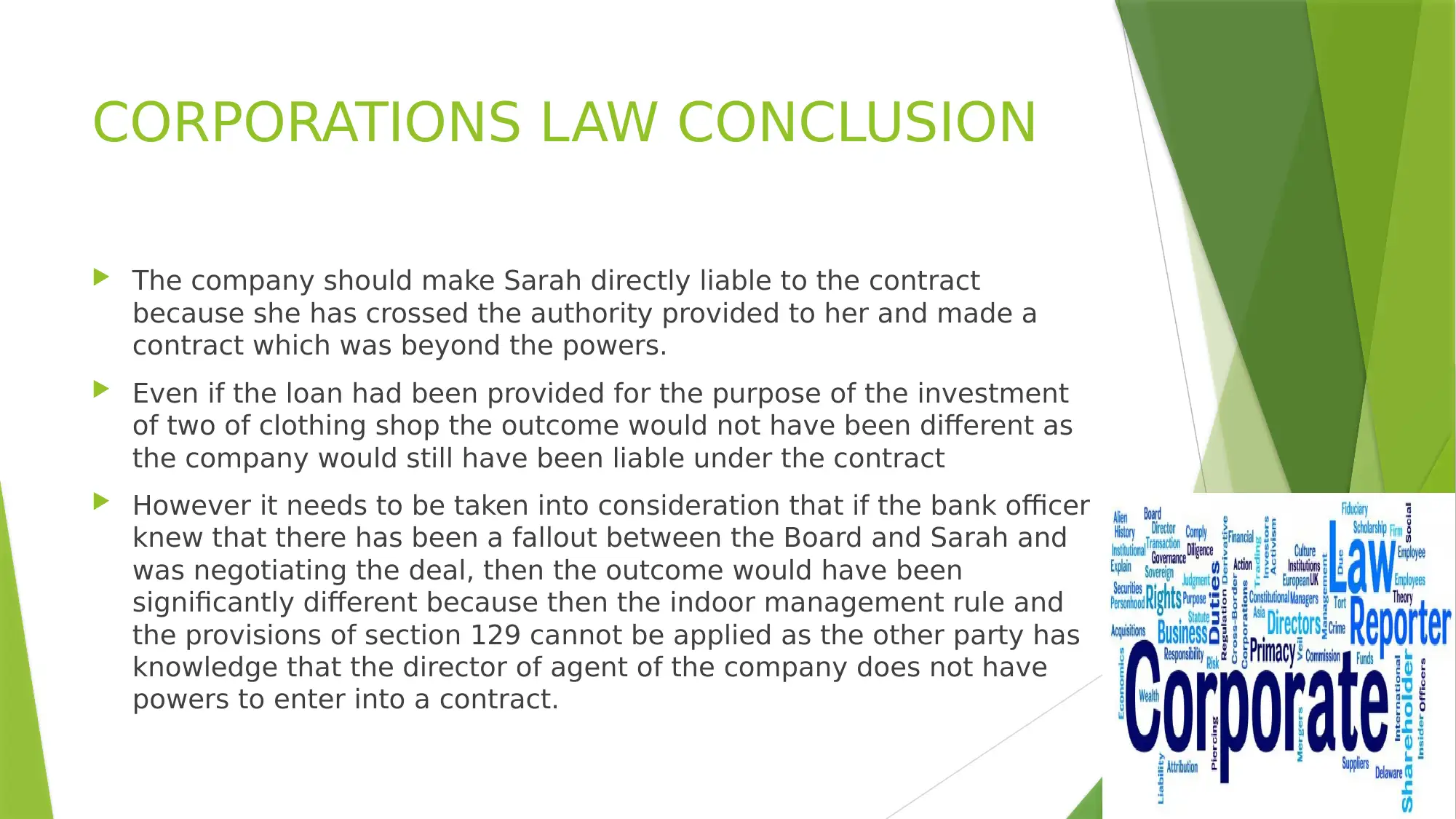
CORPORATIONS LAW CONCLUSION
The company should make Sarah directly liable to the contract
because she has crossed the authority provided to her and made a
contract which was beyond the powers.
Even if the loan had been provided for the purpose of the investment
of two of clothing shop the outcome would not have been different as
the company would still have been liable under the contract
However it needs to be taken into consideration that if the bank officer
knew that there has been a fallout between the Board and Sarah and
was negotiating the deal, then the outcome would have been
significantly different because then the indoor management rule and
the provisions of section 129 cannot be applied as the other party has
knowledge that the director of agent of the company does not have
powers to enter into a contract.
The company should make Sarah directly liable to the contract
because she has crossed the authority provided to her and made a
contract which was beyond the powers.
Even if the loan had been provided for the purpose of the investment
of two of clothing shop the outcome would not have been different as
the company would still have been liable under the contract
However it needs to be taken into consideration that if the bank officer
knew that there has been a fallout between the Board and Sarah and
was negotiating the deal, then the outcome would have been
significantly different because then the indoor management rule and
the provisions of section 129 cannot be applied as the other party has
knowledge that the director of agent of the company does not have
powers to enter into a contract.

⊘ This is a preview!⊘
Do you want full access?
Subscribe today to unlock all pages.

Trusted by 1+ million students worldwide
1 out of 12
Related Documents
Your All-in-One AI-Powered Toolkit for Academic Success.
+13062052269
info@desklib.com
Available 24*7 on WhatsApp / Email
![[object Object]](/_next/static/media/star-bottom.7253800d.svg)
Unlock your academic potential
Copyright © 2020–2025 A2Z Services. All Rights Reserved. Developed and managed by ZUCOL.





